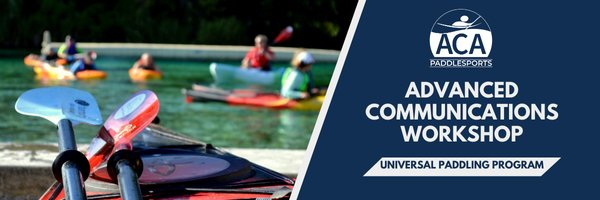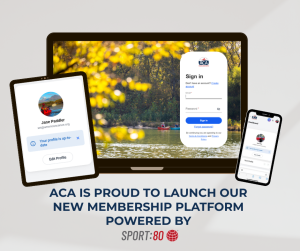
The ACA Advanced Communications program, including the Instructor Endorsement award, was designed in to convey effective strategies for teaching and learning, risk assessment and management, and effective facilitation of on-water group dynamics for paddlesports programs to seamlessly include individuals who have vision impairment or blindness, hearing impairment or deafness, as well as speech, language, and/or perceptual impacts from any type of disability. – ACA Affiliate, Adaptive Expeditions
The ACA Universal Paddling Program started in 1990 – same year as the Americans With Disabilities Act (ADA). The program began with the Adaptive Paddling Workshop (APW) curriculum. The APW has been quite successful, featuring hands on practice for modifying equipment for those with mobility impairments. Throughout the years, some items were identified as missing from the APW program: a toolbox to maximize participant ability and inclusion for paddlers with vision impairments / blindness, hearing impairments / deafness and communication differences. In 2018, the ACA Advanced Communications Workshop (ACW) program was developed!
In the words of ACA Instructor and Advanced Communications course participant, Robert Nissenbaum:
“This workshop was invaluable. Immediately after getting on the water with both club outings and as an instructor, I was more aware of how I was communicating – what I was saying, and how else I could get the information across.
- I was more cognizant of where paddlers were and how I could communicate with them when needed.
- I was paying more attention to body language and behavior of others to pick up on potential communications issues that weren’t disclosed.
- I was also acutely aware of my own behavior on the water and how it impacted others and their ability to communicate with me.
Beyond the understanding and the tools that will make me a better trip lead and instructor, the Advanced Communications Workshop has made me a better paddler.”
Want the full scoop? The ACA Universal Paddling Committee has got your back!
Q: How does the ACW compare to the APW (Adaptive Paddling Workshop)?
A: Both emphasize tools to integrate individuals with disabilities into paddlesports programs.
- Both build on paddler ability.
- Both include understanding of how the Americans with Disabilities Act applies to paddlesports access and risk management.
- APW curriculum includes concepts of Universal Design.
- Equipment selection, modification, and adaptation to maximize ability for those with mobility impairments.
- For part of the workshop, Endorsement Candidates work with paddling students with a physical disability/ mobility impairment to customize equipment through adaptation development and testing.
- ACW curriculum includes Universal Teaching Strategies and Multi-Sensory Learning.
- Provides increased understanding of how to effectively communicate with paddling students, listen to their needs and abilities, as well as gain understanding of vision, hearing and communication differences.
- Activities with peers to experiment with environmental awareness and teaching strategies through focus on multiple sensory inputs.
- Targeted strategies to optimize learning for those with vision impairments / blindness, hearing impairments / deafness, and communication differences.
Q: Why is this content important?
A: In the 2020 census, 1 in 4 individuals identified as having a disability. Chances are, you have individuals with disabilities as students! Improving your skills and knowledge will increase outreach and paddler success.
Q: Why paddling?
A: Water is a unique environment!
- For those with mobility impairments water removes many physical barriers – no sand, stairs, trees, ramps, etc.
- Gone also is the need for wheelchairs, canes, walkers etc. Everyone on the water is part of a sleek craft – removing many social barriers. For some it is, “Liquid Freedom.”
- Paddlers commonly use additional visual and auditory signals on the water – which prepares us to expand our awareness, get creative and work to accommodate those who have visual, hearing or communication differences.
Come learn and play with us! We have an upcoming course offering in Minnesota, September 21-22, 2024.

